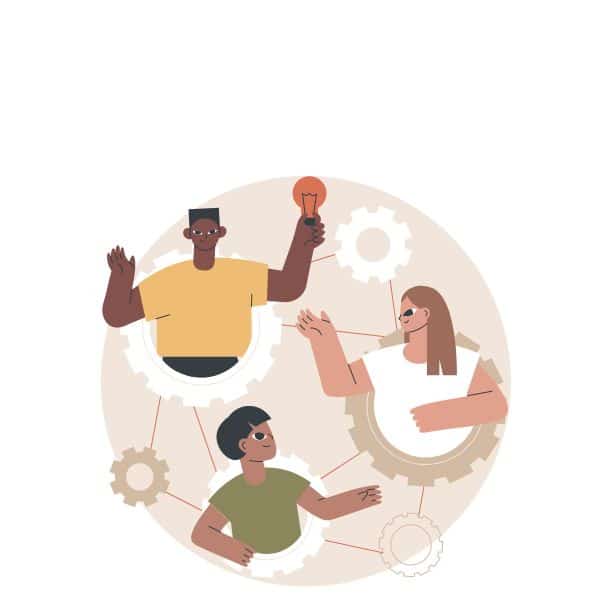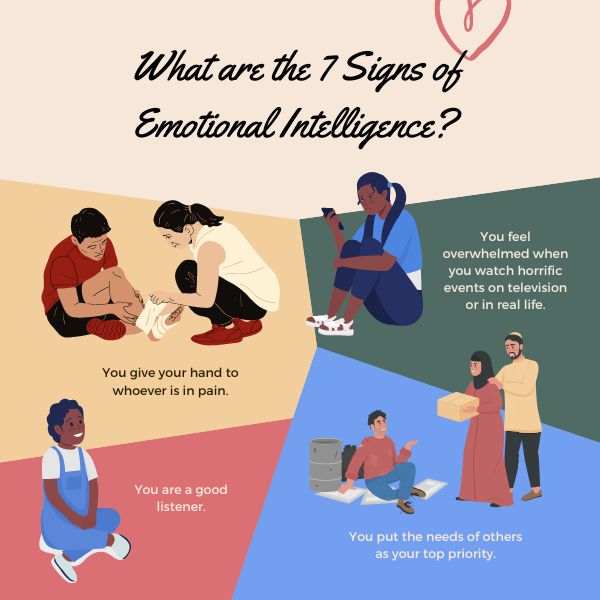Emotional Intelligence
Emotional intelligence (EQ) is the ability to identify, use, understand, and manage emotions positively to relieve stress, communicate effectively, empathize with others, overcome challenges, and defuse conflict. People with high EQ tend to be more content, resilient, and successful at work and in relationships. Here are 7 signs you have strong emotional intelligence:
Self-Awareness of Emotions

You’re attuned to your inner thoughts and feelings. You can identify what you’re feeling and what triggered those emotions. Self-awareness is the foundation of EQ because you first need awareness of emotions to manage them effectively. Signs of high self-awareness include:
• You understand how different situations influence your mood.
• You recognize subtle changes in your emotions.
• You can articulate what you’re feeling and why.
• You know your emotional strengths and weaknesses.
Strong self-awareness means you spend little time confused about your internal state. You don’t let emotions build up or fester because you notice them early. This awareness gives you a faster ability to adapt and cope with challenges.
Manage Your Emotions Effectively

You regulate your emotions in stressful or tense situations rather than letting them control you. You pause before reacting emotionally, thinking through potential consequences. Signs of strong emotional control include:
• You avoid inappropriate emotional outbursts at work and home.
• You can calm yourself down when angry or upset.
• You think through options carefully before making important decisions.
• You set boundaries and say “no” assertively when needed.
Mastering your emotions means you respond constructively rather than react impulsively. While high-arousal feelings like anger and excitement have valuable functions, they only help when you experience and express them healthily.
Show Empathy for Others

You understand and share the feelings of other people. You see situations from multiple perspectives rather than just your own view. Signs of high empathy include:
• You can identify what others might be feeling based on facial expressions and body language.
• You make an effort to understand other peoples’ viewpoints.
• You avoid judging others, even if you disagree with them.
• You try to ‘put yourself in their shoes’ to connect emotionally.
Empathy is a key social skill and differentiator of high EQ. It helps you defuse tension, resolve conflicts fairly and build stronger relationships. Showing empathy makes people feel heard, validated, and cared for.
Adaptability to Change
You adjust your emotions, thoughts, and expectations in response to new developments. When plans change, or challenges arise, you can roll with the punches rather than get stuck or frustrated. Signs of strong adaptability include:
• You avoid getting rigid about how things ‘should be’.
• You remain optimistic and solution-focused when facing obstacles.
• You change your perspective or approach flexibly based on the situation.
• You find potential value in unexpected circumstances.
Emotional agility helps you navigate life’s inevitable changes and surprises. The more adaptive you become, the less drama and suffering you experience from external events beyond your control.
Social Skill and Awareness

You pick up on social cues like tone of voice, facial expressions, and body language. You sense and adjust to a group’s mood. Signs of strong social awareness include:
• You notice emotional undercurrents in conversations.
• You monitor your own verbal and nonverbal communication.
• You listen actively and ask insightful questions.
• People seem at ease sharing personal information with you.
High EQ helps you build rapport, find common ground and connect with others authentically. Your social awareness gives you an edge in relating to customers, coworkers, friends, and family.
Optimistic Attitude

You tend to look on the bright side even when faced with difficulties. You generally expect good outcomes and believe in people’s good intentions. Signs of optimism include:
• You focus on potential gains more than potential losses.
• You view setbacks as temporary rather than never-ending.
• You find potential lessons in challenges.
• You remain hopeful and motivated through hard times.
Optimism improves your ability to cope, make decisions, stay motivated, and build resilience. It keeps stress from overwhelming you and compromising your performance. A positive attitude expands your options and opportunities.
Impulse Control
You think before speaking or acting, considering potential consequences. You avoid emotional responses that you’ll later regret. Signs of strong impulse control include:
• You pause and collect your thoughts when angry or upset.
• You avoid saying something hurtful you cannot take back.
• You think through options rationally before making choices.
• You handle conflict without overreacting or completely shutting down.
Impulse control is an important life skill. High EQ allows you to remain more calm, focused, and productive – even when stressed. You make choices that align with your values and priorities rather than just coping in the moment.
Conclusion
In summary, EQ is a set of skills you can develop over time. The more you reflect on signs like self-awareness, empathy, and impulse control, the more opportunities you’ll find to strengthen your emotional intelligence. With effort and commitment, even small increases in EQ can bring tremendous benefits to your well-being, relationships, and work life.

